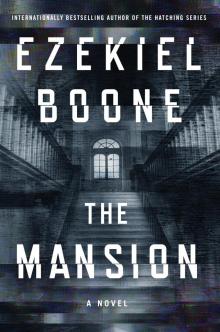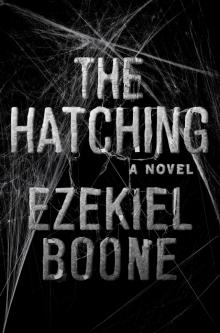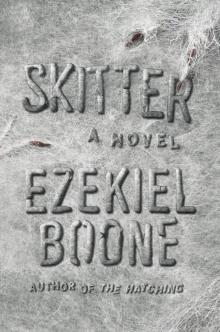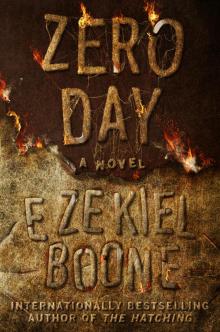- Home
- Ezekiel Boone
The Mansion Page 2
The Mansion Read online
Page 2
Shawn laughed. “Whatever you want, Billy. In a can or a glass?”
“Can.”
It was surprisingly low-tech. Shawn walked to the door, which was an endeavor in itself given the size of his office, and stuck his head out, calling to his assistant. Wendy. Her name was Wendy.
“Anything else?” Billy shook his head. “Hotel is fine? And the flight was okay? Sorry you had to go commercial. I would have sent a jet for you, but I lent one of mine to Taylor Swift. She has her own jet, of course, but there’s something or other with an engine, and she’s a friend. And my other two planes are being redecorated. The board has been giving me a hassle about using the company jets for private business.” Shawn waved his hand in annoyance. “They don’t want me to treat Eagle Technology like it’s my own private playground anymore. Corporate governance crap.”
Billy didn’t say anything. Commercial. It’s not like he had to rough it. A limousine had picked him up at his and Emily’s squalid studio apartment in Seattle and taken him directly to the plane. The plane. As in, drove out onto the tarmac at SeaTac, where a flight attendant was waiting to open a stairway at the base of the jet bridge so that he could go right on up and into the plane and take a seat in first class. He’d never even gone into the terminal. Another flight attendant, a young Latino kid with just a hint of a mustache, had greeted him by name as he boarded, calling him Mr. Stafford and making sure that he was comfortable, asking if he could get him anything.
It had only been one gin and tonic.
“I guess you probably want to know why I asked you to come?” Shawn said.
“Very astute of you, Shawn. We haven’t talked directly for a decade, since you screwed me over—”
“The court—”
“The court can go screw itself. And screw you, Shawn. Screw you!” Billy said. No. He didn’t say it. He yelled it. He realized he was shouting. And Shawn’s personal assistant, Wendy, was standing on the steps looking terrified. He bet Wendy was easily clearing a million a year plus stock options and whatever perks she wanted. She probably got to fly in one of Shawn’s private jets whenever she needed to go somewhere. She was staring at Billy, and he shut up and turned so that he could watch her in one of the mirrors on the wall instead.
He felt like shit. For thinking about her like she was just some sex object. For yelling and scaring her. For who he was afraid he might be. For the sobriety token missing from his pocket. For all the ways he’d messed up his life. For the things that he and Shawn kept buried.
He shouldn’t have come.
He saw Wendy look over at Shawn. Shawn shrugged, so Wendy stepped over to Billy and handed him the can of Diet Coke. Just what he’d asked for. What he needed. The cold metal was a relief. He pressed the can against his forehead for a moment before opening it. His temper. It had become worse since he’d gotten sober.
Shawn waited until Wendy was gone and then he held up his palms. A symbol of peace. “Hear me out, okay? I know that you and Emily are having some hard times.”
Hard times. What a colloquial way of putting it. They were flat, dead-ass broke. Four months behind on their rent. Nine credit cards that Emily knew about, all maxed to the point where the plastic was in danger of melting. Four more credit cards that Emily didn’t know about. Their car, a piece of shit deathtrap that had been nice once, was more rust and holes than actual metal. It started most of the time, but the brakes were so shot that they were afraid to drive it on the highway. He wouldn’t have minded it so much if he’d still been blotto all the time. It would have made sense, then. Of course we’re broke! I’m drinking and snorting every dollar that comes in! No wonder we don’t even have enough change lying around to make our pockets jingle!
But he’d been stone-cold sober for two years. Not quite two years. He reached into his pocket again. Twenty-three months and . . . four days. No one-year coin. Not even lint in his pocket. That’s how broke they were. But there were no excuses: since he’d gotten sober, he’d stayed sober. Just that one gin and tonic on the plane. He deserved that. It was only one drink, which was nothing. Back before he got sober he could line them up and knock them down. One gin and tonic wouldn’t have even counted as a drink. It had been what, twelve years, thirteen, since he’d talked with Shawn Eagle like this, just the two of them alone in a room? He was fine. And it wasn’t fair to say that he couldn’t blame the drinking or the drugs; the money was good and gone by the time he sobered up. Not that there’d ever been that much money, but there’d been a period of time, five or six years, when, if he hadn’t been wealthy, he and Emily had been able to stay afloat. The rocket-ship rise of Eagle Technology had allowed his laughably small amount of stock to keep pace with his spending for a little while. If he’d kept all of it, if he hadn’t sold any of it, it would be worth just a shade under eleven million dollars now. Nothing compared with Shawn Eagle, the second-wealthiest man alive, but not bad for the son of a waitress and a drunk, abusive custodian. But he hadn’t kept all of it, of course. He hadn’t kept any of it. He’d sold it off in chunks great and small at prices that were criminal in retrospect. Maybe five hundred grand total before taxes? Not all at once, of course. He bled himself out. Booze and coke and some of it toward the failed lawsuit. It would have gone quicker, and for less, if it hadn’t been for the magical Shawn Eagle, who, according to every hagiographic newspaper and magazine article, every ball-sucking interview, was a gee-whiz genius who’d turned Eagle Technology from an idea into a global behemoth all by his lonesome. Every time Billy thought he’d run the well of his shitty settlement dry, that the miserly bit of stock he had left was gone, that there was nothing left to bail him out, Eagle Technology would go on another run, hit a new record, split at 3 to 1, split again at 7 to 1, and again at 4 to 1. But the well had gone empty, eventually. At some point, a few years ago, when he was in the deepest reaches of the bottle, there was simply nothing left to sell. How different would things have been if he’d sat on that stock? He’d be looking at eight figures, enough money for him and Emily to live in luxury for the rest of their lives. Move someplace warm. An island somewhere. Open a coffee shop or a small restaurant. But instead he’d sold pieces of the stock at every opportunity, turning it into the cold clink of ice and gin and a wedge of lime.
They were deep in it. They had some money coming in, but it was like pissing on a bonfire. Emily was working at a preschool, and she was happy with the little moppets, and Billy had picked up part-time work on the night cleaning crew at a huge chain health club. Working as a custodian for minimum wage. Like his dad. But not a drunk like his dad. Not anymore. The pay was a joke and the work was a joke, but none of it was funny. He should have been sitting at a computer and conquering the world, but nobody would touch him. It was ridiculous. Picking up coding languages used to be as easy as breathing for him. Shawn had been a good programmer. A really good programmer. More important, Shawn had a terrific understanding of how people actually interacted with computers, what they wanted but didn’t know they wanted. The real magic, however, had come from Billy. He’d been the one who made Eagle Logic come alive. It had worked best when they were working together. Even at the beginning when it was Billy and Shawn and . . . After. It had worked best after.
They had come up with the idea of integrating a new coding language and program to create something wholly different, but Billy was the one who’d seen the way to break a computer’s logic apart and give them something more. Without Billy there was no Eagle Logic, and without Eagle Logic, there was no Eagle Technology.
But there was no Billy anymore. Nobody but Shawn Eagle. Billy was in the dustbin of history, cast as opportunistic in the bestselling authorized biography Learning to Soar: The Story of Shawn Eagle and the Rise of Eagle Technology. What little space was given to him described him as a parasite, the entire lawsuit framed as an extortion attempt, with the author’s barely disguised glee at Billy’s walking away with a few thousand shares and Shawn’s vindication. No, in the story of Eagle Technology, Billy barely ex
isted, and to the extent that he did exist, it was as the villain. Shawn was the prince. Shawn was the hero. Shawn deserved all the credit, all the praise, and Billy deserved what he got: nothing.
Which was why he wanted to punch Shawn in the face.
He took another sip of his Diet Coke and then very deliberately sat on one of the white leather couches. If he decided to punch Shawn, he’d actually have to get up and stride across the room. It would be a decision. Not a reflex. Standing there, with Shawn so close to him, it would be too easy. So he sat down and listened.
“It’s been too long,” Shawn said. “Too long like this. Do you remember what it was like? That ridiculous cabin in the woods? In the winter, the wind would come through the cracks in the boards like a freight train. It would shriek at us. Just howling, screaming through the cabin. What did you call it? The freeze-ball express? And every time we got the woodstove hot enough to heat the place up, it would glow cherry-bomb red at the hinges and we’d double-check to make sure the fire extinguisher was ready. And remember when, despite how creepy it was, we tried going into Eagle Mansion, thinking we could light a fire in one of the grand fireplaces and that would be a good way to get warmed up? We busted up an entire set of chairs from the dining room, and when we actually got the fire lit, a whole shitload of bats came flying out of the chimney and we were running around screeching like little kids? Heck, man, we probably could have just carted in one of those tables and a set of chairs to Cortaca and sold them to an antiques dealer for enough money to feed us for half a year. Oh, and I can’t believe I forgot about this,” he said, laughing, “when the electricity got cut off that first summer, and we jury-rigged solar panels so we could keep our laptops charged?”
Billy smiled. He didn’t want to, but he smiled. He didn’t want to admit it, but he’d been happy then. Despite everything that happened, he had been happy. “And it rained for a week so we couldn’t get a charge, and we were trying to work out the code by writing it on the walls?”
“It was like living in the worst, scariest, most rustic dorm in the universe. But worse, because Eagle Mansion was just looming there, taunting us, like, hey, I used to be an awesome place to live before I fell in on myself and turned haunted, and you guys are stuck in what probably used to be a servant’s cottage.”
“Yeah, well,” Billy said, “could have been worse. We could have been in the burned-out groundskeeper’s cottage that you grew up in. That place gave me the heebie-jeebies.”
A thin smile. “Yeah.” A real smile now. “And, shit. That first Thanksgiving, when we forgot that it was Thanksgiving, and we drove all the way from the cabin, over an hour into Cortaca, and Saigon Kitchen was, unbelievably, open, but they didn’t take credit cards, and neither one of us had our bank cards, so we had to scrounge change from the car? We barely had enough money to get one order of Sriracha chicken wings to go, so we put it on a plate and made that our Thanksgiving turkey.” Shawn laughed, and for a moment, Billy did remember.
It had been glorious. They’d been so alive and so young, still at that age when they couldn’t understand the idea of getting old. They’d work thirty days in a row, getting up at eight or nine in the morning and starting out with bowls of sugared cereal—if they were lucky, and the electricity was keeping the tiny fridge humming, they had fresh milk, and if they weren’t lucky, they ate it dry—and coding until two or three in the morning. They bought noodles and whatever meat was close to the expiration date at the off-brand grocery store in Whiskey Run, and once a month, when the ridiculously small check came in the mail from Shawn’s aunt Beverly, they’d drive the extra thirty miles to Cortaca and get burritos and stock up on cheap beer. They’d take a day to mess around in the woods and get loaded and recharge themselves for the next push of trying to make the idea of Eagle Logic into a reality. The cabin was a single room within spitting distance of what used to be the grand Eagle Mansion, a Prohibition-era resort that had once been graced by the rich and famous.
The mansion. Thinking of it made Billy shiver. The mansion looked like something from a horror movie: the roof was caving in and missing in spots, vines grew in and out of shattered windows, the walls were crumbling in places, and the whole building loomed over them. It was haunted. They were convinced of it. A few times, Billy woke in the middle of the night and thought he saw lights flickering in the mansion. Shawn was convinced that, one night, during their first winter, he’d seen a dark-haired woman gliding across the roof. Dead things came to life in that building. Dark things. They were young and dumb and men, so they couldn’t keep themselves completely away from Eagle Mansion, but mostly, Billy had been leery of the old monolith. No way they would have stayed there if it hadn’t been free.
The estate itself felt sprawling and equally full of mischief. Trees had grown thick and dark. Hedges had gone wild. What was once a great lawn was scattered with thorns. It was easy to imagine getting lost in the surrounding wilderness. Swallowed alive by the forest. At night, it seemed like the woods inched closer to their cabin.
The cabin was better. Less . . . possessed? Possessed. That was the word, Billy thought. It was cold and dank, but it was just a building. Eagle Mansion and the scattered outbuildings, including the groundskeeper’s cottage, which had burned—with Shawn’s parents in it—when Shawn was twelve, positively seethed. Early in their residency, they’d dropped acid and wandered around the grounds. Billy had found himself inside Eagle Mansion, barely holding it together. The walls pulsed and seemed to breathe. He thought the carpets were made of blood.
No. The cabin was safe. By scavenging some wood and shingles from the other outbuildings, they were able to make it livable. Barely livable, but livable. Aunt Beverly was paying the taxes on the estate, such as they were. She insisted that Shawn keep the land, since it had been in his family for generations.
“If you want to sell it when I’m dead and gone, then by all means,” she had said during one of the times that she came to visit. Billy remembered it well. He’d liked the old bird, though she probably hadn’t actually been that old at the time, no more than fifty or fifty-five. She always brought groceries and often other items, like frying pans or blankets or other things they needed and that she “just happened” to find stored in her basement in brand-new packaging from Target. “But you hold on to it for now. It’s only twenty acres, and given how decrepit the old mansion is and that you’re in the middle of nowhere, the taxes are a pittance. Trust me. You won’t get much of anything if you sell, and you’ll always regret it. You’ve got a family history here, as dark as it might be, and you can’t walk away from that.”
All they had to do was pay for electrical service, which they mostly did, and not freeze to death, which was sometimes touch-and-go. It wasn’t much of a cabin, and Billy couldn’t imagine a meaner place to develop an idea as beautiful as what they’d been trying to code, but for twenty-three months, it had been their home, their headquarters. They’d slept on camping pads, in secondhand sleeping bags and under blankets they bought from Goodwill or that Shawn’s aunt brought them. They cooked on the woodstove and took shits in the woods, in an outhouse that didn’t have a door: they’d taken it off to use as a desktop. “For shit’s sake,” Billy had loved to say, “our desk is an outhouse door!”
Shawn shook his head. “I don’t think I’ve ever been as happy as I was then,” he said. “The two of us working together in that cabin.”
“Three,” Billy said. The word just escaped from his lips. He hadn’t meant to say it.
“What?”
“The three of us.”
He didn’t say the name.
Takata.
There’d been three of them. Shawn and Billy and Takata. He’d wanted to forget. Or maybe he had forgotten. It was like the echo of a sound that he could almost hear. Takata. How had he buried that so deeply in his memory?
There’d been three of them until, one day, there were only two of them. And from that day on, things had gotten worse; to go outside at night
was to feel the mansion breathing in and out and glaring down at them. It was as if what they’d done had flipped some sort of switch. The mansion and the grounds turned from simply scary to something malevolent: blood calling for blood. And yet they didn’t talk about Takata. The thing with Takata had come well before they’d even met Emily, well before Billy and Shawn had their falling out, well before Billy had heard Shawn say, as Billy walked away with Emily, “I guess you get the girl.”
Shawn stared hard at Billy, and Billy remembered something he’d read in an interview once. Shawn had been asked about a deal Eagle Technology had made with a supplier in Indonesia, a deal so advantageous to Eagle Technology that the supplier went out of business in a matter of months. “You don’t build a company like Eagle Technology by being the nicest guy in the room,” Shawn said to the woman interviewing him. And when Billy read it, he’d thought it was just another one of those glib things that Shawn had learned to say, just part of the polish of being Mr. Hot Shit CEO and on People magazine’s list of men who could get a blow job in an elevator any day of the week, but right at that moment, with Shawn staring at him, Billy felt cold. He felt like he had on those winter mornings in the cabin in the woods outside Whiskey Run, when the snow was piled up so high on the roof that the entire cabin creaked with every shift of the wind, when the metal of the woodstove screamed like a soul being torn from the body as the first fire of morning turned the newspaper and kindling into the promise of a better day. On those winter mornings, he’d wake up from the cold. He would sleep in so many pants and shirts and socks that he could barely move, a five-dollar sausage in a fifty-cent casing. Still, he woke up with his teeth chattering, his wispy adolescent beard covered in a rime of frost, and he’d think it was possible that he’d never be warm again. That’s what it felt like having Shawn stare at him right now.
“Do you really want to talk about that,” Shawn said. “Do you really want to talk about”—he bit down on the name like his life depended on it, like it was a struggle to get out, like he hadn’t uttered it in years and years—“Takata?”

 The Mansion
The Mansion The Hatching
The Hatching Skitter
Skitter Zero Day
Zero Day